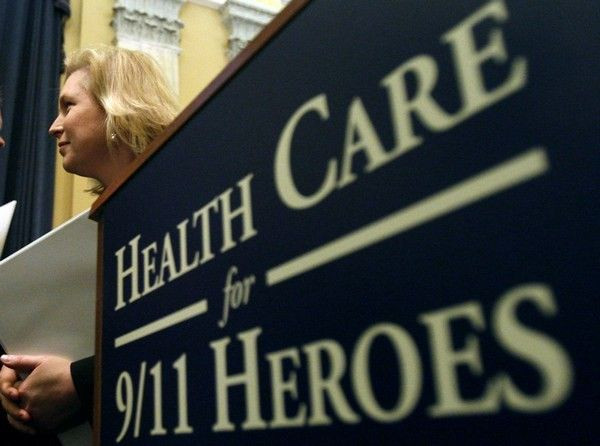Senators push Ground Zero health bill

With time running out on the 111th Congress, two New York Senators are pulling out all the stops for passage of the James Zadroga bill.
Sens. Kirsten Gillibrand and Charles E. Schumer, both D-NY, are hopeful that a less expensive bill to provide healthcare and compensation to 9/11 first reponders will be able to pass the Senate beofere the year is out.
The senators announced this weekend that they have trimmed $1.2 billion from the measure that passed the House in November, and that they have found a better way to pay for the remaining costs.
Gillibrand and Schumer said they have received a commitment from Senate Majority Leader Harry Reid to hold a vote on the bill this week once debate on the New START treaty is ended. They said the changes to the 9/11 bill were likely to win enough Republican support to block a filibuster.
I believe we now have more than enough votes to pass this legislation. We have been working extremely closely with a number of Republicans and have made a series of changes to the bill. Americans will be watching closely over the next few days and expecting the Senate to do what is right and fulfill our moral obligation to these heroes, Gillibrand said.
The bill would provide for permanent healthcare and compensation for the more than 20,000 responders made ill while doing recovery and clean-up at the ruins of the World Trade Center. Supporters of the bill say that at least 900 first responders have died from illness contracted at Ground Zero since 2001. The bill is named for a New York City police detective who is believed to be the first first reponder to die, in 2006, from illness contracted at Ground Zero.
The measure that passed the House provided $7.4 billion, but the Gillibrand/Schumer measure cuts that amount to $6.2 billion, because of a separate settlement reached with many ailing Ground Zero workers last month.
Additionally, in response to concerns raised by Senate Republicans, Gillibrand and Schumer unveiled a new way of paying for the bill. Instead of relying on the House-passed offset that closed foreign tax loopholes, the new Senate bill would impose a 2-percent excise fee on certain foreign companies that receive U.S. government contracts. This raises roughly $4.5 billion over 10 year. To offset the remaining cost of the 9/11 measure, the bill includes two other revenue-raising measures that have passed the Senate either unanimously or on a broad, bipartisan vote.
Since this bill was blocked last week, we have redoubled our efforts to reach out to Republicans so we could finally pass this bill. The clock is winding down, but we believe we are on the verge of an eleventh-hour breakthrough. This has been a long process. It's been like running a marathon. We've had a lot of ups and downs, but now the finish line is in sight. Barring a setback, we believe we are on a path to victory by the end of this week, Schumer said.
© Copyright IBTimes 2024. All rights reserved.





















